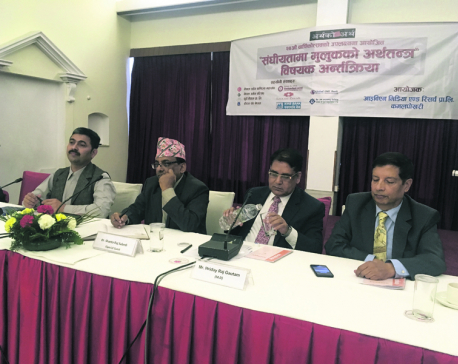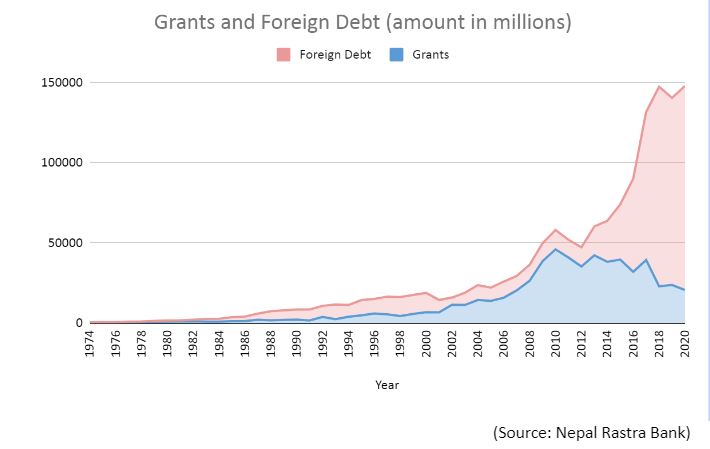
OR
Opinion
The Grant Trap: An Unfathomed Economic Curse
Published On: May 25, 2022 06:30 AM NPT By: Pradip Kumar Kafle

Debt trap has been a topic of concern in Nepal, as a significant portion (approximately one tenth) of the total revenue needs to be allocated annually for paying the interest and principal to the foreign lenders.
In the realm of economics, foreign aid is often ridiculed as an activity of snatching away the hard-earned money from the poor people of the rich countries and giving it to the rich people of the poor countries. Going through the history of aid and diplomacy, one would be amazed by the plethora of instances where this sort of disturbing distribution of wealth has occurred between the rich and the poor. The ‘self-proclaimed’ rich countries of the global north have been flooding the funds to the ‘so-called’ poor countries full of rent seeking political sharks, though former’s citizens were and are still suffering the three big curse; inequality, poverty and unemployment. Yet, castles of sand are being built and crumbled repeatedly.
There has been a wide debate on the boons and banes of foreign aids and grants. Scholars have a divided opinion on this matter. For instance, Jeffry Sachs, in his book, ‘The End of Poverty’ (2005), mentions that poor countries require a big push from wealthy nations to get out of the abyss of poverty. But, notable scholars like Isabelle Rothstein (2014) from Lund University propose that a grant could be a trap, after in-depth study of foreign aid in post-conflict Cambodia. Her study presents that foreign aids in the developing states with weak governance often have negative impacts on the recipient country’s development. Further, examples of Zairean Disease is widely cited in the literatures, as decades of large scale foreign assistance left not a trace of progress and enabled incompetence, corruption and misguided policies in many countries.
Nepal heralded the acceptance of foreign aid on 23 January 1951, receiving an assistance from the United States in the name of Point Four Program. After opening up this mystic Shangrila to the world, the country was in dire need of money to fund its ambitions of establishing itself as an emerging economy. So, it underwent gathering grants from the then benevolent countries such as the US, Japan, Russia, China, India, the United Kingdom, etc. The amount and number of grants was humongous in the decades of 60’s and 70’s, soon to shift the assistance in the form of loans. But, after bitter experience of grants from the underdeveloped African and Asian countries, Caucasians realized the real issue of grants such as ownership among citizens, rent-seeking among politicians and hesitance among donors, and pursued the paradigm shift from grants to loans after the 1980’s. And, that played a role in piling up the foreign loans of Nepal, a costly source of fund.
Recently, the debt trap has been a topic of concern in Nepal, as a significant portion (approximately one tenth) of the total revenue needs to be allocated annually for paying the interest and principal to the foreign lenders. Realizing this obligation, some parliamentarians and economists today are found to boast the need to ask for the abundant amount of grants (the free money), unlike loans, for funding the capital expenditure. At a first glance, it seems like a good proposition for a layman, but our experience with grants leaves us with huge costs rather than economic growth.
Grant reduces the cost of doing nothing
We, citizens, are in a social contract with the leaders in the government over a clause that they have to work as per the commitments in their manifestos. So, it’s their responsibility to search for abundant resources, allocate the scarce resources properly and increase social welfare. And, if they fail to fulfill this mandate, they have to bear the cost, the cost of being thrown out of the throne via elections. Each time, they have proven themselves worst in this assignment of leading the nation to prosperity. But the irony is that the same figures are the ones to spearhead us till date as their mismanagement and embezzlement of resources has been disguised by the grants and loans. For instance, Nepal has marched a step ahead in Gender Equality, increasing average life expectancy, happiness index, peace index, etc. with the help of international partners and these achievements are the only ‘face-saving shields’ for politicians to beg votes. Grants provided by international agencies have been the cushion for disguising corruption and underperformance in revenue collection. If more funds flow at free of cost, the country can go on with high levels of tax evasion, corruption, vehemently big informal economy and yet show some marks of development. So, grants are the best means for reducing the cost of bad governance for politicians in power.
Aid fungibility hurts education and research sector
Aid Fungibility refers to the possibility for aid recipient countries to reduce investment of own resources in the sector that receives aid and transfer them to other sectors of the budget. There are two particular sectors, namely Education and Research and Development, which are hit hard by this situation. As donors were mostly interested in improving the reach of education to the remotest part of the nation, they worked on it vigorously. But, this crowded out the government’s attention and funds in the education and R&D sector. Today, that gets reflected in the quality of education that students receive here in Nepal. There are neither any big private R&D firms, nor does the government take any initiative to aid research activities. Our administrators and politicians forgot their responsibility to invest more in Education, Research and Skills development, which is one of the prominent pillars of long-run growth and sustainable development.
Losing human capital to aid agencies
A few years back, one of the topmost bureaucrats was flayed in parliament by opposition lawmakers for leaving his responsibility as ‘Chief Secretary’ and joining a supranational institution. However, the truth is that many government job incumbents are being engaged with international agencies concomitantly, though it’s illegal de jure. The cream of intellectuals, upon which the government invests so much, is finally lost to those agencies and it has been a curse for every emerging country that receives heavy aids. In a country where the most educated are working for aid agencies, there will be a natural tendency for the people to be dependent on donor-driven actors same as any working person is dependent upon their income source. The author also further fears that a high proportion of educated people will have an interest in Nepal staying aid dependent!
Fostering the institutional failure
Mahendra P Lama (2021), an Indian Author and Professor of Economics, in an interview vividly purports that the biggest problem of contemporary Nepal is ‘The Institutional Failure’. As rightly noted by Lama, not only government offices lack institutional resiliency, but also private institutions run with debilitating state of governance in Nepal. One of the plausible reasons for that is- we always depended upon foreign actors for our biggest development pursuit and we never practiced a few core elements required for development such as ‘Co-ordination between agencies’, ‘Citizen Ownership’, ‘Research and Development’, ‘Brainstorming Practice’ etc. Our partners always performed these crucial actions on behalf of us, making us dependent upon them forever. The blatant failure of co-ordination between Nepse and Sebon; NEA and Road Department is known to all of us. The World Bank recently got out of a transmission line project due to the lack of citizens ownership. And, Nepal being forth vulnerable to climate change still does not have a single institution that researches and campaigns to work on this problem. The above mentioned are some corners that we are missing.
However, it would be too early to floccinaucinihilipilificate (*regard something as worthless) grants at this juncture of slow growth and high inflation, succumbed by depleting foreign reserves. But, Nepal must not always beg the path to prosperity. For now, the ongoing crisis of credibility, low accountability, populist policies, jingoist decision making, blind eye to corruption, and bad-governance must be checked and balanced by citizens via their voting rights. Otherwise, the abyss and chasm of ‘The Grant Trap’ is inevitable.
You May Like This

Inland Revenue Department meets revenue collection target in Q1
KATHMANDU, Oct 27: The Inland Revenue Department has succeeded in meeting its target of revenue collection in the first quarter of... Read More...

Swelling import has turned the economy upside down: Revenue Secy
KATHMANDU, August 26: Revenue Secretary Shishir Dhungana on Friday said that swelling import has turned the country's economy upside down. Read More...

Conflict likely between provincial, local govts over revenue collection: Experts
KATHMANDU, April 26: Economists and fiscal federalization analysts have warned that conflict could break out between provincial and local governments over... Read More...

Just In
- World Malaria Day: Foreign returnees more susceptible to the vector-borne disease
- MoEST seeks EC’s help in identifying teachers linked to political parties
- 70 community and national forests affected by fire in Parbat till Wednesday
- NEPSE loses 3.24 points, while daily turnover inclines to Rs 2.36 billion
- Pak Embassy awards scholarships to 180 Nepali students
- President Paudel approves mobilization of army personnel for by-elections security
- Bhajang and Ilam by-elections: 69 polling stations classified as ‘highly sensitive’
- Karnali CM Kandel secures vote of confidence




















Leave A Comment